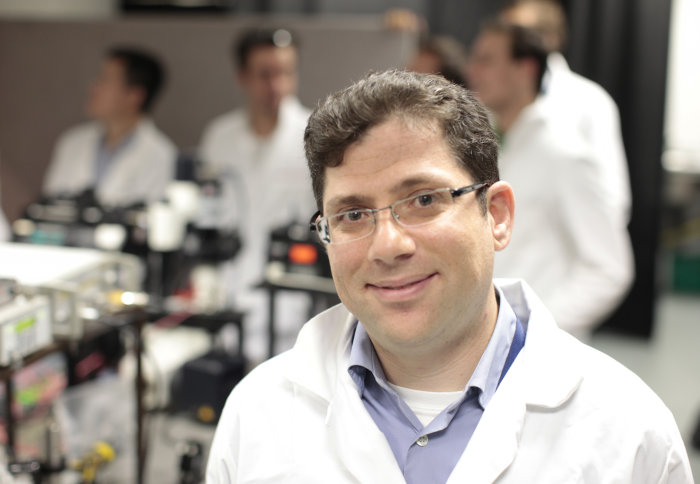Two Imperial scientists win ERC grants for ‘blue skies’ research

Two Imperial researchers have won prestigious European Research Council (ERC) Proof of Concept grants to explore frontier research.
Academics working in Chemistry and Bioengineering have been awarded up to €150,000 each to work on ways to diagnose diseases earlier and develop a new treatment for pancreatic cancer.
The ERC has announced funding totalling €9.3 million to 62 ERC grant holders across Europe in the latest wave of its Proof of Concept scheme.
The grants will help the scientists explore the commercial or societal potential of their ERC-funded discoveries. The UK was Europe’s largest recipient of awards, with 10 in total.
Quicker diagnosis

Joshua Edel, Professor of Biosensing & Analytical Sciences at the Department of Chemistry is developing novel ways to diagnose diseases earlier by detecting biomarkers in blood and urine.
Professor Edel said: “I have been exceptionally fortunate to have received a number of ERC grants in the past. They have all made exceptional impact in my career and facilitates the blue skies research I enjoy performing.
“This current proof of concept grant will allow me to translate my research from a lab based setting to a platform that can hopefully one day improve patient care, survival rates, and quality of life.

Professor Edel, who is collaborating with colleague Dr Alex Ivanov, explained: “As part of my ERC consolidator grant, we have performed initial studies on developing strategies to detect biomarkers at ultralow concentrations in biological fluids such as blood and urine.
"The presence of, or changes in the concentration of, certain biomarkers in biological fluids can be indicators of disease. However, in the early stages of disease these ‘biomarkers’ can be difficult to detect, as they are relatively rare.
“This ERC proof of concept grant will provide the resources required to build on our promising data to develop a novel, easy to use, robust and inexpensive point-of-care diagnostic tool.”
Finding new ways to treat pancreatic cancer

Dr Armando del Río Hernández, from the Cellular and Molecular Biomechanics Laboratory in the Department of Bioengineering, was awarded funding to work on new ways to treat pancreatic cancer.
Dr del Río Hernández said: “Pancreatic ductal adenocarcinoma (PDAC), the most common type of pancreatic cancer, is the fourth-leading cause of cancer related mortality and is predicted to be the second leading cause of cancer death by 2030.
“Widely regarded as a death sentence, the five-year survival rate is less than five per cent and this figure has not changed over the past four decades due to lack of effective therapies.
Dr del Río Hernández said: “Our previous research recently identified the G protein-coupled estrogen receptor (GPER) as a potential therapeutic target for pancreatic cancer.
“This grant will allow us to test in vitro the efficacy of newly identified compounds to reprogram stromal cells – that surround the tumour – to physiological conditions and to restrain the survival of cancer cells.
“Following this, we will investigate the efficacy of peptide hydrogels to deliver these compounds to pancreatic organoids.”
Taking discoveries forward

Jean-Pierre Bourguignon, President, European Research Council, offered his “warmest congratulations” to both the Imperial recipients.
The President added: “ERC-funded research is a long-term investment that lays the foundations for the industries and services of the future. The Proof of Concept scheme helps ERC grantees take their discoveries a step closer to market or societal issues.”
Proof of Concept (PoC) grants, worth €150,000 each, aim to help researchers explore the commercial or societal potential of their work.
They can be used in various ways, for example to explore business opportunities, prepare patent applications or verify the practical viability of scientific concepts.
Previous PoC funding has helped scientists set up new companies and attract capital to make their research marketable.
Article supporters
Article text (excluding photos or graphics) © Imperial College London.
Photos and graphics subject to third party copyright used with permission or © Imperial College London.
Reporter
Stephen Johns
Communications Division